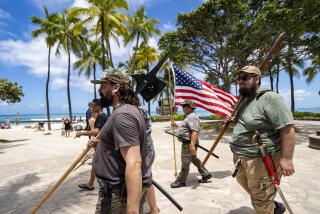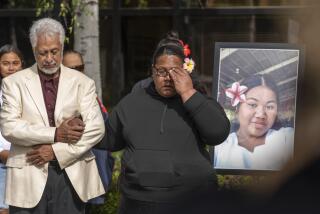Hamlet’s Police Want the Right to Bear Arms
- Share via
HOOPER BAY, Alaska — When Hooper Bay’s seven police officers go on patrol, they tend to deal with small-town peacekeeping duties, not the violent crime of their big-city cousins. And that’s fortunate, for Hooper Bay is the only known municipality in the United States whose police officers are forbidden to carry firearms.
The desire of officers to carry arms and the refusal of village leaders to permit them has caused a rift. Town leaders say they fear that firearms will just make the village more dangerous, even in the hands of cops. Police say town leaders are being unreasonable.
“Unpredictable, unexpected things don’t happen here often, but they do happen,” said Police Chief James Hoelscher, 27, who has lived in Hooper Bay since he was 13 and became a village police officer at 18. “A little Yupik Eskimo village is not immune to what can happen in Anchorage or Los Angeles or anywhere else.”
Village leaders are unconvinced.
Elmer Simon, tribal government administrator, said he would support properly trained officers using guns -- but only in emergency situations. Otherwise, he said, they should keep them locked up.
“A lot of young people wouldn’t hesitate -- especially if they’re under the influence of alcohol -- to grab a handgun from the officers and use it against them,” Simon said. “Not that we’re against handguns. But accidents do happen.”
Hooper Bay is an Eskimo village of 1,100 on the windblown Bering Sea coast, about 515 miles west of Anchorage. It is among the last communities in Alaska without running water or a sewage system.
The village has existed for more than a century, incorporating as a city in 1966. It has steadily grown in recent years despite high unemployment and few job opportunities. Commercial fishing and subsistence fishing and hunting are the primary means of support. Well over a third of the population is unemployed and receiving public assistance.
And no one can remember a time when police carried guns.
Hooper Bay leaders cite concerns over potential mishaps or misuse of authority, even by professionally trained officers. Hoelscher and two others graduated last fall from the University of Alaska Fairbanks’ law enforcement academy.
Both the Fraternal Order of Police and the International Assn. of Chiefs of Police said they were unaware of any other organized municipality in the nation whose officers don’t carry guns.
But Hooper Bay police have never carried firearms, old-timers say. And until the current flap, it’s never been an issue.
“We’re not a big enough village to justify carrying guns,” said City Administrator Raphael Murran.
The chief said there’s good reason for his officers to carry firearms. In fact, he keeps his own gun locked up at the station and, policy or not, he has taken it on a few potentially risky calls. It’s not always possible to wait for armed help from state troopers in Bethel 150 miles away, he said.
“I’d rather be fired than killed,” said the married father of four. “I have a family to go home to.”
Police regularly deal with such potential flashpoints as domestic violence and liquor-fueled assaults in Hooper Bay, which bans the sale or importation of alcohol, Hoelscher said. In June, police logged 104 alcohol-related calls and seven domestic violence reports. They made 33 criminal arrests on charges including assault, harassment, eluding police and furnishing alcohol to a minor.
Then there was the choking incident.
In December 2001, police answering an assault call ran into a drunk and combative man who lunged at an officer, choking him until the officer blacked out, according to court documents. The officer recovered, and the man served time in jail after pleading no contest to assaulting a police officer.
Hoelscher thinks that the assault might not have occurred if the officer had been wearing a sidearm, even if it was never drawn.
“It’s hard to guess what would have happened if the officer was armed,” he said. “But if people know you’re armed, they might think a little harder.”
Or react more aggressively, opponents say.
“Knowing an officer is armed may amplify the situation,” said Simon, the tribal administrator. “All areas have to be considered. It’s a serious issue.”
In May, Hoelscher, five officers and three dispatchers threatened to resign in protest over what they perceive as micromanagement and a lack of support by city officials.
In his May 5 resignation letter, Hoelscher said other council policies and budget cuts undermined the department.
He’s running the department now on an annual budget of $330,000, compared to $490,000 two years ago, when he had a 10-officer force.
Ten days later, city officials met with police and voted unanimously to reject the resignations, then gave the department a vote of confidence. Guns were not mentioned at the meeting, but Hoelscher and his staff agreed to stay if the city would let police do their jobs.
“It’s working out great so far,” Hoelscher said. The gun issue, however, “needs to be brought up eventually. But it’s a political hot potato.”
Hoelscher plans to address the council after he and the two other academy-trained officers are fully certified in early November after field training by Alaska state troopers this summer.
Mayor David Bunyan said he would support trained police officers carrying guns at all times. He praised the current police department for cutting down on crime in a village with a history of rampant lawlessness, primarily before residents voted to outlaw alcohol in 1983.
“Training is a whole package, and gun use is part of that training package,” Bunyan said.
City Councilman David Green, a former village police officer, said he opposes armed officers because of the inherent risk of abuse.
“They would start showing them off. I guarantee it,” he said. “I could see the officer taking it out and doing tricks and the gun accidentally discharging. Or if they arrest somebody, I’m afraid the suspect would take their gun.”
Trooper 1st Sgt. Duke Ballard, a 23-year state veteran, said he has mixed feelings about arming Hooper Bay police.
On the one hand, there’s the village’s unruly past. But on the other, people are used to guns being restricted. Then there’s the cost of liability insurance, training, ammunition and weapons recertification.
“It’s not a simple matter of buying a box of bullets and a gun,” Ballard said.
John Olson, a lifelong Hooper Bay resident who manages the grocery store, said many locals are uncomfortable with the idea because they think it’s unnecessary, even dangerous. What if the officer dropped the gun in a scuffle? What if the wrong person got it? What if someone got hurt -- or worse?
“In this town, everyone knows everyone; a lot of people are related to each other,” Olson said. “If a cop accidentally shot someone, I could see a bunch of relatives going after them.
“I personally don’t mind if police carry guns. But I don’t see it happening here.”
More to Read
Sign up for Essential California
The most important California stories and recommendations in your inbox every morning.
You may occasionally receive promotional content from the Los Angeles Times.










